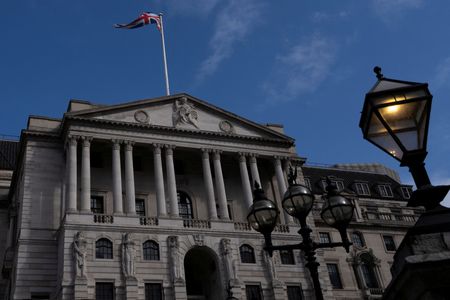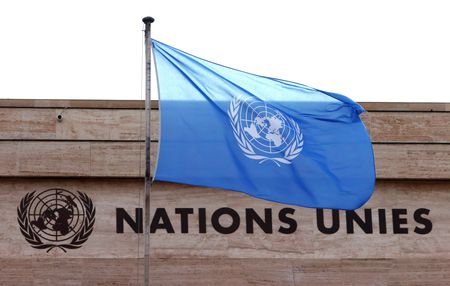By David Milliken
LONDON (Reuters) -Bank of England policymaker Alan Taylor said on Monday that he voted for a half-point rate cut last week – in defiance of the majority on the Monetary Policy Committee – because of a “quite perilous” trade situation as well as weakening domestic demand.
Last week the BoE voted 5-4 to cut rates to 4.25% from 4.5%, with a three-way split where Taylor and another policymaker voted for a cut to 4% and two other policymakers unexpectedly voted to keep rates on hold.
Taylor, the newest member of the MPC, struck a more downbeat tone than Deputy Governor Clare Lombardelli and MPC member Megan Greene did earlier on Monday at the same conference hosted by King’s College London and PGIM Global Asset Management.
“The erosion of confidence that we saw has continued. We’re getting very low readings on PMI and REC and so forth. So there’s that continuation, the sort of wait and see in … precautionary saving (and) postponement of investment,” he said.
Both Lombardelli and Greene – who each voted for a quarter-point cut – said high rates of wage inflation made them wary of cutting rates and said the central bank expected U.S. tariffs to have a relatively modest downward impact on British growth and inflation.
Taylor said Trump’s tariffs had been more wide ranging than he had expected and described a deal reached by Britain’s government last week – which will still see most goods exports to the United States subject to a 10% tariff – as “quite slender”.
Waiting for conclusive evidence that all inflation pressures had eased before cutting rates would leave BoE policy behind the curve, he added.
“The international dimension for me is quite perilous,” he said.
Taylor said he was reassured by wage settlements data which he said supported BoE forecasts that headline wage growth would slow sharply this year from its current rate of nearly 6%.
Rising public inflation expectations – a source of concern for some other policymakers – were a lagging indicator as a portion of the public were slow to spot price changes.
(Additional reporting by Suban Abdulla and Muvija M; Editing by Susan Fenton)










